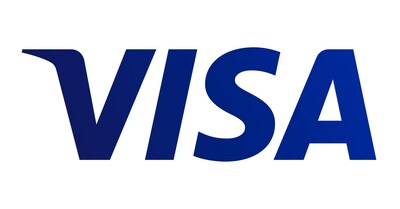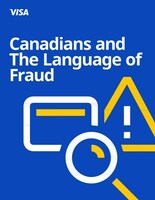This Fraud Prevention Month, Visa shares the most common language and terms used by fraudsters to lure Canadian consumers.
TORONTO, March 6, 2023 /CNW/ - Canadians are transacting digitally more than ever before. Quick, frictionless, real-time payments have created many benefits for consumers, but this has also created a wider landscape for fraudsters (also known as "threat actors"). As personal information is digitized, consumers are at increased risk of being targeted by threat actors seeking to get a hold valuable information.
Visa developed a linguistic analysis called, "The Language of Fraud," to reveal how language is used by scammers and understand the risks and vulnerabilities Canadian consumers experience during fraud attempts. According to the report, threat actors craft messages designed take advantage of consumer willingness to trust too-good-to-be-true texts and emails.
The report highlights how criminals have reached a new level of sophistication to ensnare the savviest Canadian consumers who believe they are experts at spotting them. Canadians are confident in their ability to spot a scam when they see it, with more than half (58%) considering themselves highly knowledgeable about fraudulent behaviours.1
However, a turn of phrase can turn a simple click into a breach of personal information. Whether in the workplace or on the go, Canadians receive multiple offers by phone, text, and email for "free gifts" and traps to "act now" to supply personal information before a vital service gets cut off. This is what Visa calls, "The Language of Fraud", and it is working.
More than one third (35%) of Canadians admit to having fallen for a scam on one or more occasions.2 Over half (59%) of those surveyed in Canada said they typically respond to terms or phrases fraudsters commonly use in emails or text messages.3
"Canadians are cautious about financial security threats, but it is crucial to remain diligent when it comes to security hygiene. Be sure to update passwords regularly, avoid clicking on links in any unsolicited emails or texts, and never give out sensitive data to anyone over the phone unless you are sure who you are talking to," says Maryam Saeed, Head of Risk at Visa Canada. "Trust and security are foundational to Visa's network, and we pride ourselves as being a trusted partner in the payments ecosystem – providing the right solutions to minimize risk."
Fraud Prevention Month is a valuable time for Canadian businesses and consumers to educate themselves about financial security threats, learn about evolving protection measures, and do all they can to make sure they are protected.
While cybercrime persists, Visa is mission-driven to protect consumers and mitigate fraud. Over the past five years, Visa has invested more than $10 billion in technology to counter fraud and increase network security.4 More than a thousand dedicated specialists protect Visa's network from malware, zero-day attacks and insider threats, around the clock and year-round. In 2022 alone, Visa helped prevent an estimated $27 billion in fraud.5
Visa knows that, in a digital-first economy, security is a priority for businesses of all sizes and sectors across Canada and has developed multiple fraud prevention and detection systems and programs to protect their data, and that of their customers, and encourages Canadians to make use of its online resources to learn more.
About Visa
Visa (NYSE: V) is a world leader in digital payments, facilitating transactions between consumers, merchants, financial institutions and government entities across more than 200 countries and territories. Our mission is to connect the world through the most innovative, convenient, reliable and secure payments network, enabling individuals, businesses and economies to thrive. We believe that economies that include everyone everywhere, uplift everyone everywhere and see access as foundational to the future of money movement. Learn more at Visa.ca.
1 The Visa Security — Global Survey was conducted by Wakefield Research among 6,000 Nationally Representative Adults in 18 Markets between September 7th and September 14th, 2022, using an email invitation and an online survey.
2 The Visa Security — Global Survey conducted by Wakefield Research
3 The Visa Security — Global Survey conducted by Wakefield Research
4 Visa Inc. Annual Report, 2022
5 Visa Inc. Annual Report, 2022
SOURCE Visa Canada
© Canada Newswire, source Canada Newswire English





